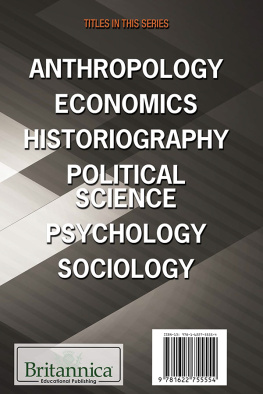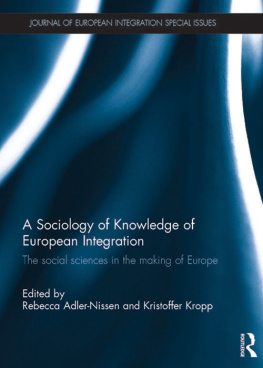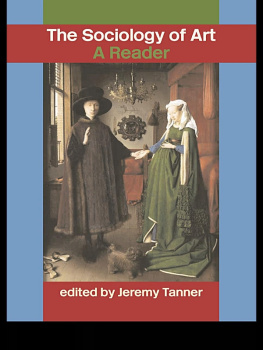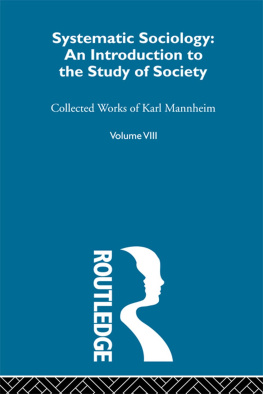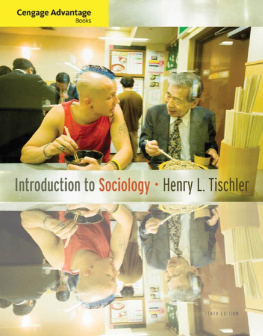ROUTLEDGE LIBRARY EDITIONS: SOCIAL THEORY
Volume 19
THE ESSENTIAL COMTE
THE ESSENTIAL COMTE
Selected from Cours de Philosophie Positive by Auguste Comte
First published in Paris 183042
Edited and with an Introduction by
STANISLAV ANDRESKI
Translated and annotated by
MARGARET CLARKE
First published in 1974
This edition first published in 2015
by Routledge
2 Park Square, Milton Park, Abingdon, Oxon, OX14 4RN
and by Routledge
711 Third Avenue, New York, NY 10017
Routledge is an imprint of the Taylor & Francis Group, an informa business
Introduction 1974 Stanislav Andreski
Translation 1974 Croom Helm Ltd
All rights reserved. No part of this book may be reprinted or reproduced or utilised in any form or by any electronic, mechanical, or other means, now known or hereafter invented, including photocopying and recording, or in any information storage or retrieval system, without permission in writing from the publishers.
Trademark notice: Product or corporate names may be trademarks or registered trademarks, and are used only for identification and explanation without intent to infringe.
British Library Cataloguing in Publication Data
A catalogue record for this book is available from the British Library
ISBN: 978-0-415-72731-0 (Set)
eISBN: 978-1-315-76997-4 (Set)
ISBN: 978-1-138-78610-3 (Volume 19)
eISBN: 978-1-315-76365-1 (Volume 19)
Publishers Note
The publisher has gone to great lengths to ensure the quality of this reprint but points out that some imperfections in the original copies may be apparent.
Disclaimer
The publisher has made every effort to trace copyright holders and would welcome correspondence from those they have been unable to trace.
THE ESSENTIAL COMTE
SELECTED FROM
Cours de Philosophie Positive
BY AUGUSTE COMTE
First published in Paris 183042
Edited and with an Introduction by
STANISLAV ANDRESKI
Translated and annotated by
MARGARET CLARKE
FIRST PUBLISHED 1974
INTRODUCTION 1974 BY STANISLAV ANDRESKI
TRANSLATION 1974 BY CROOM HELM LTD
CROOM HELM LTD 210 ST. JOHNS ROAD LONDON SW11
PUBLISHED IN THE USA 1974 BY
HARPER AND ROW, PUBLISHERS INC.
BARNES AND NOBLE IMPORT DIVISION
CROOM HELM ISBN 0856640492 CLOTH
0856640549 PAPER
BARNES AND NOBLE ISBN 064901815 CLOTH
064901823 PAPER
PHOTOSET, PRINTED AND BOUND
IN GREAT BRITAIN BY
REDWOOD BURN LIMITED
TROWBRIDGE & ESHER
CONTENTS
TRANSLATORS NOTE
Many of Comtes pleonasms and expletivesadjectives, adverbs, subordinate phrases, have been pruned away, as they are heavy in English and obscure rather than illuminate the thought.
Cross-references to parts of the six volume course not included in this selection are given in the Notes. Where Comte summarises the reference it is translated in the body of the test.
Physics is used in the nineteenth-century sense for natural science in general. The fifth chapter treats of what Comte calls physics properly so called, the science of energy and matter to which the word is usually confined today. Art is also used in a sense more of the nineteenth than of the twentieth century, which usually applies the word only to the fine arts. It has the meaning practical application of a science.
Comtes Place in the History of Sociology
The son of a humble and pious clerk in a small town, Isidore Auguste Comte would have kept no doubt to his station in life had he lived earlier; but he was born just in time (20 January 1798) to benefit from the widening of educational opportunities by the revolutionary and the napoleonic rgimes. Early showing a great aptitude for learning, he was able to go through lyce despite the very modest income of his father, and got as far as the top educational institution of Francecole Polytechnique. Despite a strong attachment to his mother, he kept a distance from her, did not get on well with his siblings and was on bad terms with his father. He travelled very little, never went outside France and spoke no foreign language. Once arrived in Paris, he never showed any desire to return to Montpellier.
Though theoretically in favour of strong authority even in his youth, the future author of an authoritarian utopia was a rebel in his behaviour, who continuously got into trouble with his teachers because of his obstinacy, bossiness and conceit; and, instead of making an academic career commensurate with his abilities and knowledge, he became an odd man out, able to get only occasional and ill-paid jobs as an examiner or tutor. For a couple of years he worked as Henri de Saint Simons secretary, but their overweening ambitions could not be reconciled and they parted in bitter animosity which Comte harboured until the end of his life insistently denying his obvious intellectual debt to his former mentor. His occasional part-time employment at the cole Polytechnique also came to an end after a row with the governors.
His longest lasting source of sustenance was the immoral earnings of his wife, who had been forced into this profession by poverty some years before she met Comte. He married her in full knowledge of the facts and with an ostensible intention of helping her; but his inability or unwillingness to earn a living repeatedly forced her to return to her trade. She was an intelligent woman who was interested in his work and used to turn up at his lectures even after they separated, and was willing to support him by the only method at her disposal. Although it was largely his own doing, Comte resented the situation and eventually turned against her. After the breach he lived in abject poverty, except for a short interlude after he received a donation which John Stuart Mill (who greatly appreciated the Cours though not the later writings) had raised in England. Until his death Comte continued to receive small sums as gifts from his friends and admirers, but they never sufficed to provide him with a decent living, largely because he quarrelled with his benefactors as soon as they disagreed with him on the smallest point.
Undeterred by poverty, Comte wrote an imposing array of volumes, the first of them published when he was only twenty-one. He produced the six volumes of Cours de Philosophie Positivehis most important work of which the present volume is a selective abridgementwhen in his thirties, despite a two-year interruption due to mental illness which necessitated his confinement in an asylum.
He completed the Cours after his recovery and later wrote other books, including treatises on astronomy and geometry, but the quality of his work began to decline when he passed forty. The mental deterioration took a sudden dip when, at the age of forty-five, he fell madly in love with Clothilde de Vaux, an impoverished gentlewoman of thirty, whose husband had deserted her some years earlier and who at the time was enamoured of another man. Apart from being less attached to him than his prostitute wife, Clothilde seems to have been less intelligent and less appreciative of Comtes intellect and endeavours. After one apparently unsuccessful sexual encounter, Clothilde demanded that their relationship should remain strictly platonic. Comte submitted; and (as a psychoanalyst would nowadays say) sublimated his desire into a fervent quasi-religious worship of, first, Clothilde and then of women in general, placing them in his utopia on an absurdly elevated pedestal while nonetheless denying them freedom.


